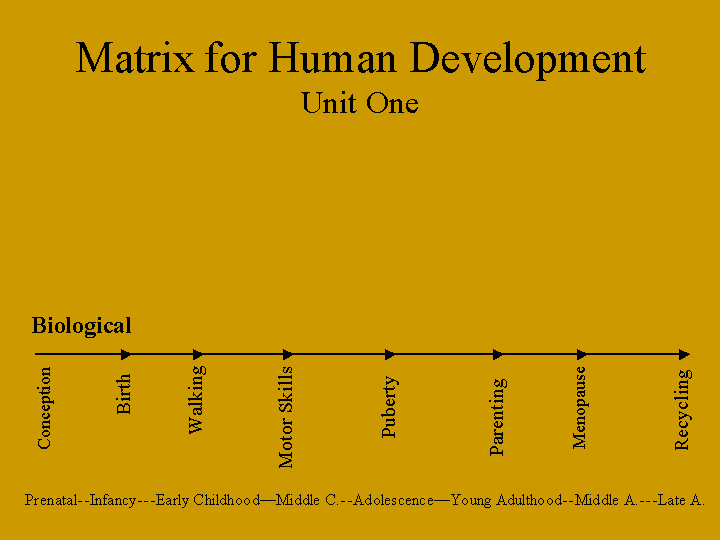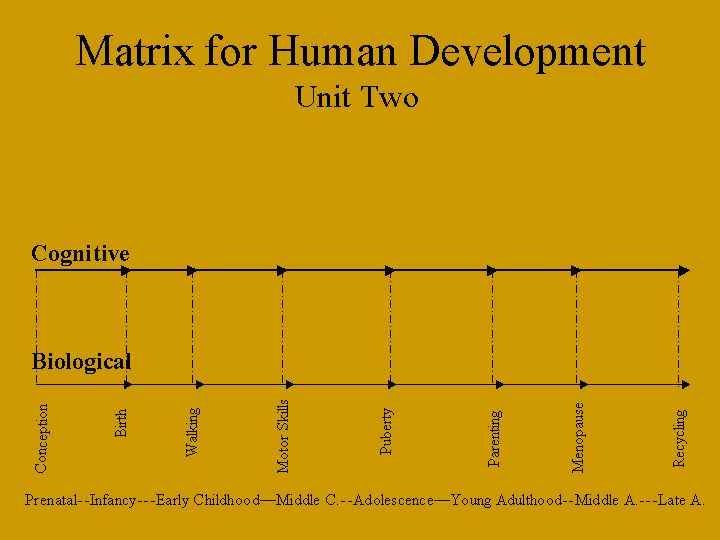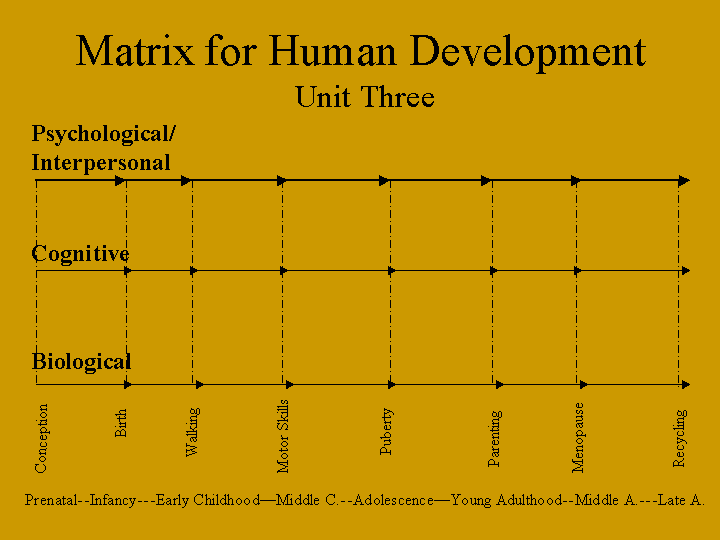Assumption 1. Whole people are too complex to grasp, so we divide them into parts -- we'll call them domains.
spiritual: our relationship to the universe
social: how we behave in groups
interpersonal: how we relate to other people
personality: emotions, how we think about ourselves and behave, our style, the ways we are different from others.
mind: intellectual processes, thinking, reasoning
body: biology, physiological processes, motor development, health & disease
-----
For convenience, not because there's any inherent truth.
But this list does proceed
from the most concrete, or scientific,
through the more abstract, or social scientific,
to the least concrete/observable and most abstract, or philosophical.
Assumption 2. Just as a whole person is too complex to deal with as a whole, a life span is too complex, so we divide it into stages and transitions, or transitions and stages.
TRANSITIONS: conception, birth, language, 5-7, puberty, participation in society, end of child-rearing, end of productive life, biological decline, death, for example.
and
STAGES: prenatal, infancy, early childhood, middle childhood, adolescence, young adulthood, middle adulthood, later adulthood, senescence, for example.
Our task is to integrate these back into a more highly differentiated, sophisticated, articulate and useful understanding of the whole person over a life span.
The resulting Matrix encourages us to think about change--a developmental viewpoint--
and about hypotheses: Connections across domains and across time
Precursors or Antecedents: What experiences or factors shape behavior or differences that we see later in life?
Consequences: What are the long term impacts of what we do at an earlier stage?



We also attend to events. Milestones, Accomplishments, Occurrences that are typical, called Normative events.
And events that are not common to everyone: Accidents, unusual experiences, rare illnesses. Non-normative events.
When do they happen? How we cope depends on what skills we have, what relationships we have, what else we are dealing with.
For normative events, do they happen at the usual time, so they are "on-time",
or are they earlier or later than typical, so they are "off-time?
and describe what is going on in each domain,
talk about how each domain is influencing the others,
and
understand how the person might experience and cope with
the event, transition, or tasks of her or his life at that time.
A person is always changing, coping, adapting, and learning.
Think about Change.
It is useful to ask what is the person trying to learn or develop, rather than asking what is wrong with the person.
A person is actively trying to make meaning of experience.
A person is applying understanding and skills to new experiences, and through practice and extension, is integrating the meaning made from new experiences into ever larger, more complex skills and understanding.
People understand what they themselves construct from their experience, not necessarily what another person wants them to understand.
People understand by interpreting the new experience in terms of what they already understand.
Think about what the person Understands, based on the person’s experience.
A person is always in a physical, intellectual, and social context with specific opportunities, expectations, and risks.
The context helps shape what the person can do and learn, and thus how the person will develop.
Development cannot be understood without understanding the context in which it happens.
Think about the Environment or Ecosystem the person is in.
Most important relationships involve Mutual Influence and are dynamic systems.
In relationships, each person contributes his or her actions, to which the other responds. The resulting transactions constitute a significant element of each person's development.
The developmental perspective applies simultaneously to each person in the relationship.
The notion of transaction also applies to the relationship between a person and the environment.